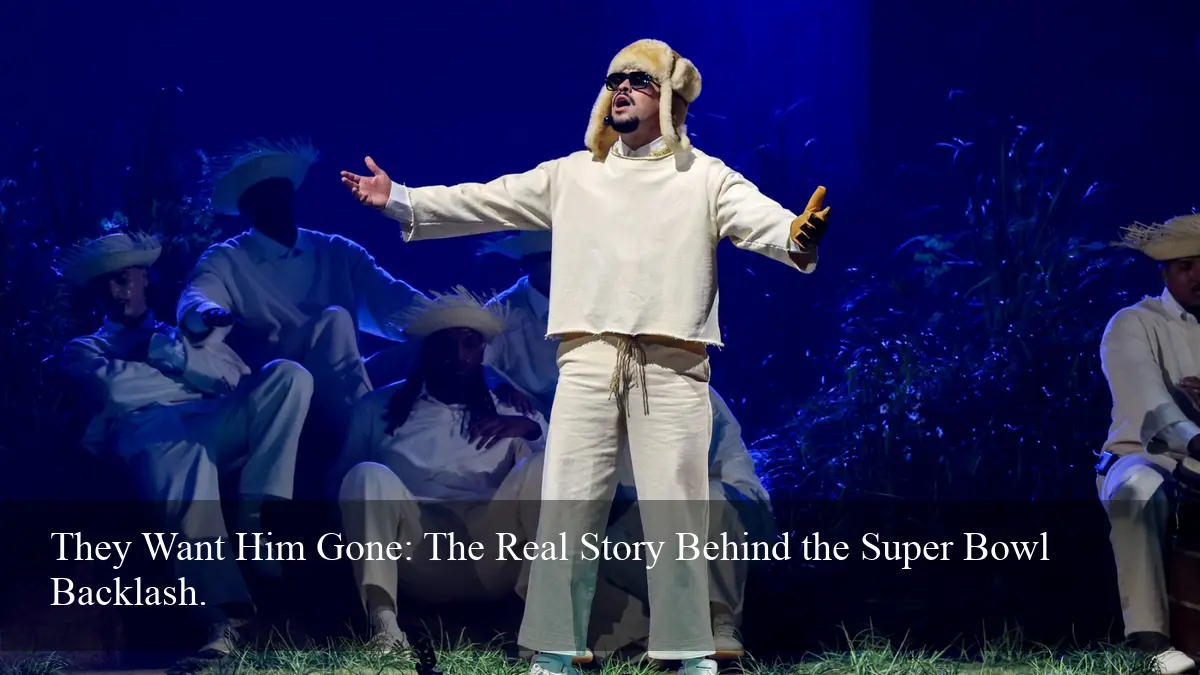- Bad Bunny’s 2026 Super Bowl halftime show is set to be the first performed entirely in Spanish, sparking immediate and fierce controversy.
- Conservative figures and right-wing groups are blasting the NFL’s choice, labeling the artist “un-American” and organizing boycotts and “counterprogramming.”
- The backlash is not new, echoing decades of xenophobic reactions against Latin artists in the U.S., including historic incidents involving José Feliciano and Ricky Martin.
- Despite the outrage, the performance is being hailed as a landmark moment for Latino representation, challenging long-standing cultural prejudices on America’s biggest stage.
The announcement that global superstar Bad Bunny would headline the 2026 Super Bowl halftime show was met with a divided reaction. While his millions of fans celebrated the historic news of the first-ever all-Spanish halftime performance, a vocal and aggressive wave of criticism emerged from conservative circles, turning a cultural milestone into a political firestorm.
The Right-Wing Backlash
Almost immediately, prominent right-wing voices began to attack the NFL’s decision. Newsmax host Greg Kelly called for a boycott, insisting that Bad Bunny “hates America, hates President Trump, hates ICE, hates the English language!” The criticism reached the highest levels of government, with Homeland Security Secretary Kristi Noem threatening that immigration agents would be “all over” the event.
Former President Donald Trump also weighed in, stating, “I never heard of him. I don’t know who he is… I think it’s absolutely ridiculous.”
This sentiment has mobilized conservative groups. Turning Point USA, a youth-focused organization, announced it would stage “The All-American Halftime Show” as a “counterprogram” to celebrate “faith, family, and freedom,” explicitly inviting requests for music that is “anything in English.” Meanwhile, online petitions circulated calling for Bad Bunny’s replacement and even his deportation—ignoring the fact that he is a U.S. citizen from Puerto Rico.
A Disturbing Pattern of Prejudice
As intense as the reaction feels, it follows an unfortunate tradition of sidelining and othering Latin artists in the United States. This isn’t the first time a mainstream performance in Spanish or with a Latin influence has been met with xenophobic outrage.
José Feliciano’s Anthem
In 1968, Puerto Rican artist José Feliciano performed a stripped-back, Latin-influenced acoustic version of “The Star-Spangled Banner” at the World Series. The performance became a lightning rod for hate mail and calls for his deportation, severely damaging his career for years. Feliciano later explained his rendition was an expression of patriotism, but many saw it as a counterculture protest.
Ricky Martin’s Grammy Breakthrough
Decades later, at the 1999 Grammys, producers heavily resisted allowing Ricky Martin to perform his hit “The Cup of Life,” convinced a Latin act singing in Spanish wouldn’t appeal to the audience. Label head Tommy Mottola fought for the slot, and Martin’s explosive performance received a standing ovation, proving the short-sighted biases wrong and catapulting him to international stardom.
A Symbol of Defiance and Representation
Bad Bunny has become a target precisely because of his authenticity. He subverts gender norms with his fashion, refuses to create commercialized English-language pop, and uses his music to address issues like gentrification in Puerto Rico and the struggles of immigrants.
Despite the rhetoric rooted in an ugly history, Bad Bunny will take the stage in February. His performance will not just be entertainment; it will be an inherent political statement. It will represent millions of Latinos in the U.S. and stand as a powerful moment of self-expression and cultural pride—one that is deeply and undeniably American.
Image Referance: https://www.rollingstone.com/music/music-features/bad-bunny-super-bowl-controversy-maga-history-1235449974/
